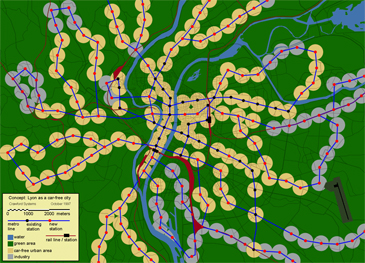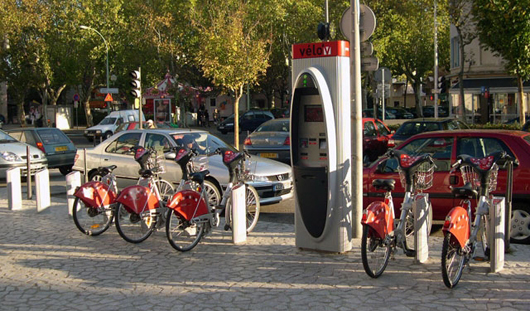
Improving mobility for citizens
Citizens of Lyon will in future have better mobility, shorter tranportation time and be less dependent on private transportation. Lyon is the first French city to engage in a master plan for transport development.
Planners of greater Lyon, France, recognise that high usage of private cars does not correspond well with sustainable city development. To solve the far-reaching problems related to transport, the city has come up with an overall plan to deal with mobility as a whole. This case describes Lyon’s Urban Mobility Master Plan on the way toward sustainable city development.
In 1997, the Urban Community of Lyon is the first French group to adopt an Urban Mobility Master Plan in its region. The objective of the plan is to re-harmonise the distribution of means of travel, to create the conditions for a pleasant town containing solidarity and thereby, in turn, favour sustainable mobility. The project for Lyon and its suburbs, and the Mandate Plan – which defines the major policy orientations for Greater Lyon up until 2007 – has a budget of 788 million Euros for investments in transport.
The Urban Mobility Master Plan (UMMP) combines a whole series of objectives, including reduction of motor traffic, development of public transport, cycling and walking, reducing the number of accidents, reducing pollution and disturbance, promoting social fairness, and the reallocating of urban space. A national committee monitors the progress of the UMMP.
The principal objectives for the Lyon transport policy is to draw up a global strategy, guaranteeing the coherence of all the decisions made concerning means of transport and seeking their complementarities. This is to seek improved harmony between the different means of transport, with a priority on public transport, developing cycling and walking, and mastering the development of the private car. Last, but not least to improve the quality of the services provided for all Lyon inhabitants, with the aim to strengthen the solidarity of the city and its suburbs and guarantee everyone easy travel within the city.
An urban mobility consultative committee is set up to co-ordinate and monitor the various initiatives. It includes the decision-making partners: The State, Region, Department, Greater Lyon Council and SYTRAL (JointTransport Administration for the Rhone department and the Lyon Conurbation), economic partners and four qualified user representatives. Any local mayors concerned by the agenda are invited to the working meetings of the Consultative Committee.
A mobility observatory is created to assess the various actions. This observatory will, among other actions, undertake an extension of the air-quality monitoring network and the creation of a transport account to register all mobility related expenses and assess the market share of the various modes of transport.

Today the public transport system in Lyon (TCL) offers many possibilities. Besides metro, tram, funiculars and bus there is also the possibility to rent a bike anywhere in the town. Bike rentals up to 30 minutes are free and subsequent hours cost between 0.50€ and 1€ per hour dependent on subscription type. However, the system is in practice virtually free to users, as over 90% of journeys last less than 30 minutes.
The subscription costs 1€ a week or 5€ a year including a credit card based deposit mechanism to encourage bicycles to be looked after and returned. It is also possible to choose taxis or taxi bikes for the price of a bus fare when traveling to a destination where there is no metro, bus or tram. Public space plans (road capacity, lane specialisation, quiet areas, etc.) will in time favour walking and cycling and discourage people from resorting to their cars.
source: SustainableCities

Fantastic idea. Simple, inexpensive and practical.
Fantastic idea. Simple, inexpensive and practical.